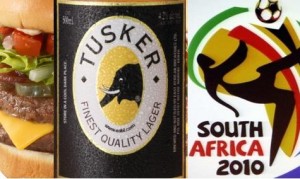
A friend of mine from way back when, Shonil, currently works with Business Monitor International in London, a leading firm in economic data analysis and reporting for over 150 countries.
He just showed me an article he helped write that breaks down the possibilities of change in the Food and Beverage industry in South Africa as predicted by the World Cup.
An extract of the article:
“While the World Cup itself will provide a major spike to alcohol and soft drinks demand, with key players ramping up promotional spending as consumers exercise less caution in spending on non-essential goods, strong investments made by these companies in the lead-up to the tournament are being made with the medium and long-term also in mind.”
Read the full article here. Thanks, Shonil and BMI!


The first line on the last paragraph on that report is worth some thought:
“The tournament will be a flagship event for post-apartheid South Africa and a major opportunity for Africa as a whole to significantly enhance its global standing.”
Aside from the beverage, food, retail, and tourism industries which the report speaks of, I am interested in the socio-economic value of this World Cup more than just the economic value.
Yes, of course, an event like this is going to raise revenue. But there’s gotta be something else that can be gained from the diversity, collaboration, and spaces that the World Cup represents.
In other words, I am interested in how people can be engaged through the World Cup, and how their interaction could set the stage for solid human development projects.
Perhaps the answer to this lies in social media, since so many folks document and chat about the games in a virtual space. But even at the local level, how can we document developments in human well-being through an event like the World Cup?
Looking forward to seeing more from Vijana FM on the “other” aspects of SA 2010!